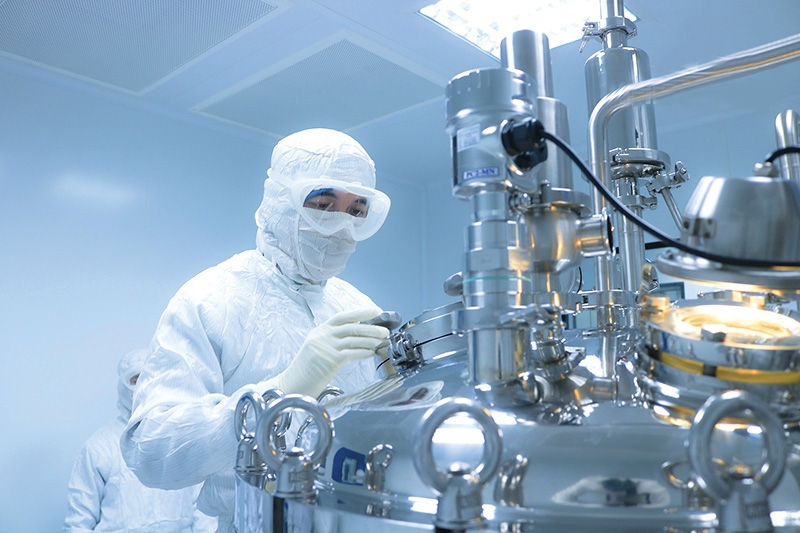Pharma drive a chance for real estate
 |
| New facilities are being constructed to serve life sciences in the country. Photo: Le Toan |
Arnaud Ginolin, director of Boston Consulting Group, said that Vietnam has a limited life science industry that still heavily relies on imports. However, growing local demand and need to further secure supply chains, along with outsourcing trends from major groups in the industry, could change that.
“Even though the country is limited in developing complex pharmaceuticals, its potential for real estate opportunities is real,” Ginolin said.
This month, Vingroup collaborated with Arcturus Therapeutics Holdings Inc. to establish a facility in Hoa Lac High-tech Park in Hanoi’s Thach That district for the production of COVID-19 vaccines. The facility is under construction and expected to have a capacity of 100-200 million doses per year. It is expected to be put into operation by mid-2022.
VABIOTECH is proposing to be in charge of packaging the Russian Sputnik V vaccine tubes from semi-finished products with a volume of five million doses per month. Advanced International JSC (AIC) and VABIOTECH have signed a deal with Japan’s Shionogi to transfer COVID-19 vaccine production technology, and is also expected to be completed by June next year.
Ginolin of Boston Consulting added that outsourcing trends are explained by cost optimisation as major groups re-focus on core competencies. Several directions were highlighted by Ginolin for Vietnam’s life science real estate, including developing manufacturing facilities, especially outsourcing from global corporations and focusing on fast-growing sub-segments – potentially high-potency molecules, biologics, and smaller flexible plants.
“In addition, focus may be placed on setting up specialised logistics facilities for both export and import, with specific cold chains for pharmaceuticals. To a lesser extent, research and development (R&D) centres and offices for growing local life science companies will occur,” he added.
To unlock the potential, Ginolin said that Vietnam would need the right regulation and certification approach to ease local and foreign investments and to work closely with the private sector regarding tech and talent transfer. “An ambitious yet pragmatic and coordinated national plan is also a key success factor,” he added.
According to the global commercial real estate services company JLL, in 2021, investor interest is growing in critical areas during the health crisis in Vietnam.
Life sciences generally consist of corporate offices, logistics facilities, R&D laboratories, and manufacturing facilities. Logistics assets, which have been one of the hottest areas in recent years, will continue to receive increased capital allocation amid the online shopping boom.
Meanwhile, domestic and international investors have targeted the health and medical logistics segment. They need more cold storage locations closer to customers to serve the growing demand for businesses and for temperature-sensitive products such as vaccines, cosmetics, foodstuffs, and pharmaceuticals.
But the driving force behind the cold logistics industry, JLL added, is not only that but also unique healthcare products. The most prominent are the COVID-19 vaccines and other vaccines that may be required. In addition to the rise in manufacturing facilities, the demand for specialised R&D facilities across the region is being supported by new establishments in key industrial zones.
Vietnam has become the R&D centre for many giant technology companies. Along with Samsung’s building of a $220-million centre in Hanoi, Vietnam is now also an R&D hub for many other companies such as LG Electronics, Panasonic, and Toshiba.
What the stars mean:
★ Poor ★ ★ Promising ★★★ Good ★★★★ Very good ★★★★★ Exceptional
Related Contents
Latest News
More News
- Construction firms poised for growth on public investment and capital market support (February 11, 2026 | 11:38)
- Mitsubishi acquires Thuan An 1 residential development from PDR (February 09, 2026 | 08:00)
- Frasers Property and GELEX Infrastructure propose new joint venture (February 07, 2026 | 15:00)
- Sun Group led consortium selected as investor for new urban area (February 06, 2026 | 15:20)
- Vietnam breaks into Top 10 countries and regions for LEED outside the US (February 05, 2026 | 17:56)
- Fairmont opens first Vietnam property in Hanoi (February 04, 2026 | 16:09)
- Real estate investment trusts pivotal for long-term success (February 02, 2026 | 11:09)
- Dong Nai experiences shifting expectations and new industrial cycle (January 28, 2026 | 09:00)
- An Phat 5 Industrial Park targets ESG-driven investors in Hai Phong (January 26, 2026 | 08:30)
- Decree opens incentives for green urban development (January 24, 2026 | 11:18)

 Tag:
Tag:





















 Mobile Version
Mobile Version